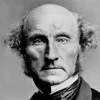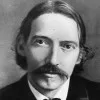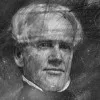I have not loved the World, nor the World me;
I have not flattered its rank breath, nor bowed
To its idolatries a patient knee,
Nor coined my cheek to smiles, — nor cried aloud
In worship of an echo: in the crowd
They could not deem me one of such — I stood
Among them, but not of them — in a shroud
Of thoughts which were not their thoughts, and still could,
Had I not filed my mind, which thus itself subdued.George Gordon, Lord Byron (1788-1824) English poet
Childe Harold’s Pilgrimage, Canto 3, st. 113 (1816)
(Source)
Quotations about:
difference
Note not all quotations have been tagged, so Search may find additional quotes on this topic.
WENDY. Where do you live?
PETER. Second to the right and then straight on till morning.
WENDY. What a funny address!
PETER. No, it isn’t.
J. M. Barrie (1860-1937) Scottish novelist and dramatist [James Matthew Barrie]
Peter Pan, Act 1 (1904, pub. 1928)
(Source)
In Barrie's novelization, Peter and Wendy, ch. 3 "Come Away, Come Away!" (1911), this is rendered:She asked where he lived.
“Second to the right,” said Peter, “and then straight on till morning.”
“What a funny address!”
Peter had a sinking feeling. For the first time he felt that perhaps it was a funny address.
“No, it isn’t,” he said.
We must overcome our fear of each other by seeking out the humanity within each of us. The human heart contains every possibility of race, creed, language, religion and politics. We are one in our commonalities. Must we always fear our differences?
The delight of social relations between friends is fostered by a shared attitude to life, together with certain differences of opinion on intellectual matters, through which either one is confirmed in one’s own views, or else one gains practice and instruction through argument.
[Le plaisir de la société entre les amis se cultive par une ressemblance de goût sur ce qui regarde les moeurs, et par quelques différences d’opinions sur les sciences: par là ou l’on s’affermit dans ses sentiments, ou l’on s’exerce et l’on s’instruit par la dispute.]
Jean de La Bruyère (1645-1696) French essayist, moralist
The Characters [Les Caractères], ch. 5 “Of Society and Conversation [De la Société et de la Conversation],” § 61 (5.61) (1688) [tr. Stewart (1970)]
(Source)
(Source (French)). Alternate translations:The pleasure of Society amongst Friends is cultivated by a likeness of Inclinations, as to Manners; and a difference in Opinion, as to Sciences: the one confirms and humours us in our sentiments; the other exercises and instructs us by disputation.
[Bullord ed. (1696)]The Pleasure of Society amongst Friends, is cultivated by a likeness of Inclinations, as to Manners, and by some difference in Opinion, as to Sciences: The one confirms us in our Sentiments, the other exercises and instructs us by Disputation.
[Curll ed. (1713)]The pleasure of social intercourse amongst friends is kept up by a similarity of morals and manners, and by slender differences in opinion about science; this confirms us in our sentiments, exercises our faculties or instructs us through arguments.
[tr. Van Laun (1885)]
Sometimes change came all at once, with a sound like a fire taking hold of dry wood and paper, with a roar that rose around you so you couldn’t hear yourself think. And then, when the roar died down, even when the fires were damped, everything was different.
If I set the sun beside the moon,
And if I set the land beside the sea,
And if I set the flower beside the fruit,
And if I set the town beside the country,
And if I set the man beside the woman,
I suppose some fool would talk
About one being better.Gilbert Keith Chesterton (1874-1936) English journalist and writer
“Comparisons”
(Source)
In "The Notebook" (1894-98). BL MS Add. 73334, fo. 5.
The poem, which has no formal title, has been printed in multiple forms. In many cases, the third line (flower/fruit) is omitted. In some cases "tower" is substituted for "town."
Precisely because the tyranny of opinion is such as to make eccentricity a reproach, it is desirable, in order to break through that tyranny, that people should be eccentric. Eccentricity has always abounded when and where strength of character has abounded; and the amount of eccentricity in a society has generally been proportional to the amount of genius, mental vigor, and more courage it contained. That so few dare to be eccentric marks the chief danger of the time.
John Stuart Mill (1806-1873) English philosopher and economist
On Liberty, ch. 3 “Of Individuality, as One of the Elements of Well-Being” (1859)
(Source)
It is useful to know something of the manners of different nations, that we may be enabled to form a more correct judgment regarding our own, and be prevented from thinking that everything contrary to our customs is ridiculous and irrational, — a conclusion usually come to by those whose experience has been limited to their own country.
[Il est bon de savoir quelque chose des moeurs de divers peuples, afin de juger des nôtres plus sainement, et que nous ne pensions pas que tout ce qui est contre nos modes soit ridicule et contre raison, ainsi qu’ont coutume de faire ceux qui n’ont rien vu.]
René Descartes (1596-1650) French philosopher, mathematician
Discourse on Method [Discours de la méthode], Part 1 (1637) [tr. Veitch (1850)]
(Source)
(Source (French)). Alternate translations:It's good to know something of the manners of severall Nations, that we may not think that all things against our Mode are ridiculous or unreasonable, as those are wont to do, who have seen Nothing.
[Newcombe ed. (1649)]It is good to know something of the customs of different peoples in order to judge more sanely of our own, and not to think that everything of a fashion not ours is absurd and contrary to reason, as do those who have seen nothing.
[tr. Haldane & Ross (1911)]It is good to know something of the customs of various peoples, so that we may judge our own more soundly and not think that everything contrary to our own ways is ridiculous and irrational, as those who have seen nothing of the world ordinarily do.
[tr. Cottingham, Stoothoff (1985)]It is well to know something of the manner of various peoples, in order more sanely to judge our own, and that we do not think that everything against our modes is ridiculous, and against reason, as those who have seen nothing are accustomed to think.
Every day of our lives we are on the verge of making those changes that would make all the difference.
Mignon McLaughlin (1913-1983) American journalist and author
The Neurotic’s Notebook, ch. 4 (1963)
(Source)
Censors don’t want children exposed to ideas different from their own. If every individual with an agenda had his/her way, the shelves in the school library would be close to empty.
The only reason why we wish to exchange thoughts is that we are different. If we were all the same, we would die dumb. No thought would be expressed after we found that our thoughts were precisely alike. We differ — our thoughts are different. Therefore the commerce that we call conversation.
Robert Green Ingersoll (1833-1899) American lawyer, agnostic, orator
“The Limits of Toleration,” Speech, Nineteenth Century Club of New York (8 May 1888)
(Source)
We have a tendency to condemn people who are different from us, to define their sins as paramount and our own sinfulness as being insignificant.
Jimmy Carter (b. 1924) American politician, US President (1977-1981), Nobel laureate [James Earl Carter, Jr.]
“A Statesman And a Man Of Faith,” interview by Don Lattin, San Francisco Chronicle (12 Jan 1997)
(Source)
DEXTER: Every day, here and at home, we are warned about the enemy. But who is the enemy? Is it the alien? Well, we are all alien to one another. Is it the one who believes differently than we do? No, oh no, my friends. The enemy is fear. The enemy is ignorance. The enemy is the one who tells you that you must hate that which is different. Because, in the end, that hate will turn on you. And that same hate will destroy you.
Our culture has accepted two huge lies. The first is that, if you disagree with someone’s lifestyle, you must fear or hate them. The second is that to love someone means you agree with everything they believe, say, or do. Both are nonsense. You don’t have to compromise convictions to be compassionate.
Rick Warren (b. 1954) American Christian pastor and author
“Rick Warren on Muslims, Evangelism & Missions,” interview with Brandon A. Cox, Christian Post (2 Mar 2012)
(Source)
At bottom every man knows well enough that he is a unique human being, only once on this earth; and by no extraordinary chance will such a marvelously picturesque piece of diversity in unity as he is ever be put together a second time.
Friedrich Nietzsche (1844-1900) German philosopher and poet
“Schopenhauer as Educator,” ch. 1 (1874) [tr. Collins]
(Source)
Everybody thought, “this time is different.” In my view, those are the most frightening words in the English language. If you look at the crises that have infected the world, the term, “this time, it’s different” has almost always been the hubris that comes before nemesis.
Andrew Crockett (1943-2012) British banker, economist, author, public servant
Speech, Pomona College, Claremont, Calif. (Apr 2009)
(Source)
Referring to the period leading up to the 2008 financial crisis.
Being like everybody is like being nobody.
Rod Serling (1924-1975) American screenwriter, playwright, television producer, narrator
(Attributed)
(Source)
Frequently attributed, but never cited. In the Twilight Zone episode, "Number 12 Looks Just Like You" (ep 05x17), the protagonist comments, "But is that good, being like everybody? I mean, isn't that the same as being nobody?" That episode is credited to Charles Beaumont and John Tomerlin.
People often say that a set of books looks ugly if all volumes are not in the same format, but I was impressed to hear the Abbot Koyu say, “It is typical of the unintelligent man to insist on assembling complete sets of everything. Imperfect sets are better.”
A man must consider what a rich realm he abdicates when he becomes a conformist.
Never hire or promote in your own image. It is foolish to replicate your strength. It is idiotic to replicate your weakness. It is essential to employ, trust, and reward those whose perspective, ability, and judgment are radically different from yours. It is also rare, for it requires uncommon humility, tolerance, and wisdom.
Dee W. Hock (1929-2022) American businessman
In M. Mitchell Waldrop, “Dee Hock on Management,” Fast Company (Oct/Nov 1996)
(Source)
Let us not torment each other because we are not all alike, but believe that God knew best what He was doing in making us so different. So will the best harmony come out of seeming discords, the best affection out of differences, the best life out of struggle, and the best work will be done when each does his own work, and lets every one else do and be what God made him for.
And now go, and make interesting mistakes, make amazing mistakes, make glorious and fantastic mistakes. Break rules. Leave the world more interesting for your being here. Make good art.
Neil Gaiman (b. 1960) British author, screenwriter, fabulist
Speech (2012-05-17), Commencement, University of the Arts, Philadelphia [19:28]
(Source)
There is no foreign land; it is the traveller only that is foreign, and again, by a flash of recollection, lights up the contrasts of the earth.
Robert Louis Stevenson (1850-1894) Scottish essayist, novelist, poet
The Silverado Squatters, “With the Children of Israel,” sec. 3 (1883)
(Source)
If men would consider not so much wherein they differ, as wherein they agree, there would be far less of uncharitableness and angry feeling in the world.
Joseph Addison (1672-1719) English essayist, poet, statesman
(Attributed)
Disputed. First attributed to "Addison" in the early 20th Century, in a paper by A. L. Evans, "Unity in Diversity," read before the Massachusetts Osteopathic Society (17 Mar 1906), and by Tryon Edwards, A Dictionary of Thoughts (1908). But this may have been a reference to another man of the same last name who was credited with publishing Interesting Anecdotes, Memoirs, Allegories, Essays, and Poetical Fragments (1794).
Do not think of knocking out another person’s brains because he differs in opinion from you. It would be as rational to knock yourself on the head because you differ from yourself ten years ago.
Horace Mann (1796-1859) American politician, abolitionist, education reformer
Thoughts (1867)
(Source)
But is uniformity of opinion desirable? No more than of face and stature. Introduce the bed of Procrustes then, and as there is danger that the great men may beat the small, make us all of a size, by lopping the former and stretching the latter. Difference of opinion is advantageous in religion. The several sects perform the office of a Censor morum over each other. Is uniformity attainable? Millions of innocent men, women, and children, since the introduction of Christianity, have been burnt, tortured, fined, imprisoned; yet we have not advanced one inch towards uniformity. What has been the effect of coercion? To make one half the world fools, and the other half hypocrites. To support roguery and error all over the earth.
Thomas Jefferson (1743-1826) American political philosopher, polymath, statesman, US President (1801-09)
Notes on the State of Virginia, Query 17 (1782)
(Source)
We don’t have to be “successful,” only valuable. We don’t have to make money, only a difference, and particularly in the lives society counts least and puts last.
William Sloane Coffin, Jr. (1924-2006) American minister, social activist
Credo, “Faith, Hope, Love” (2004)
(Source)
CALVIN: Know what’s weird? Day by day nothing seems to change. But pretty soon, everything is different.
There is nowhere you can go and only be with people who are like you. Give it up.
Bernice Johnson Reagon (b. 1942) American song leader, composer, scholar, social activist
“Coalition Politics: Turning the Century,” presentation, West Coast Women’s Music Festival, Yosemite (1981)
(Source)








































